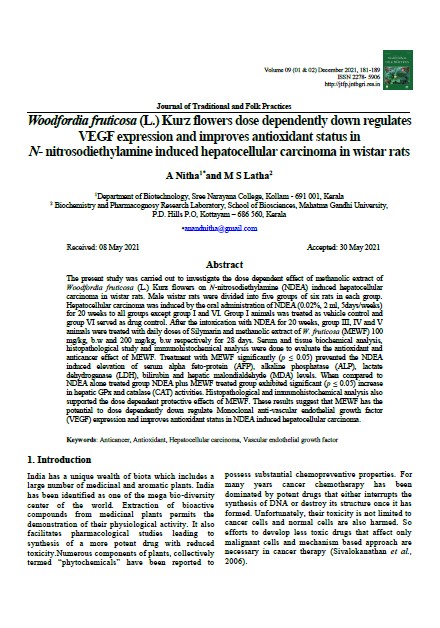Woodfordia fruticosa (L.) Kurz flowers dose dependently down regulates VEGF expression and improves antioxidant status in N- nitrosodiethylamine induced hepatocellular carcinoma in wistar rats
Keywords:
Anticancer, Antioxidant, Hepatocellular carcinoma, Vascular endothelial growth factorAbstract
The present study was carried out to investigate the dose dependent effect of methanolic extract of Woodfordia fruticosa (L.) Kurz flowers on N-nitrosodiethylamine (NDEA) induced hepatocellular carcinoma in wistar rats. Male wistar rats were divided into five groups of six rats in each group. Hepatocellular carcinoma was induced by the oral administration of NDEA (0.02%, 2 ml, 5days/weeks) for 20 weeks to all groups except group I and VI. Group I animals was treated as vehicle control and group VI served as drug control. After the intoxication with NDEA for 20 weeks, group III, IV and V animals were treated with daily doses of Silymarin and methanolic extract of W. fruticosa (MEWF) 100 mg/kg, b.w and 200 mg/kg, b.w respectively for 28 days. Serum and tissue biochemical analysis, histopathological study and immunohistochemical analysis were done to evaluate the antioxidant and anticancer effect of MEWF. Treatment with MEWF significantly (p ≤ 0.05) prevented the NDEA induced elevation of serum alpha feto-protein (AFP), alkaline phosphatase (ALP), lactate dehydrogenase (LDH), bilirubin and hepatic malondialdehyde (MDA) levels. When compared to NDEA alone treated group NDEA plus MEWF treated group exhibited significant (p ≤ 0.05) increase in hepatic GPx and catalase (CAT) activities. Histopathological and immunohistochemical analysis also supported the dose dependent protective effects of MEWF. These results suggest that MEWF has the potential to dose dependently down regulate Monoclonal anti-vascular endothelial growth factor (VEGF) expression and improves antioxidant status in NDEA induced hepatocellular carcinoma.


